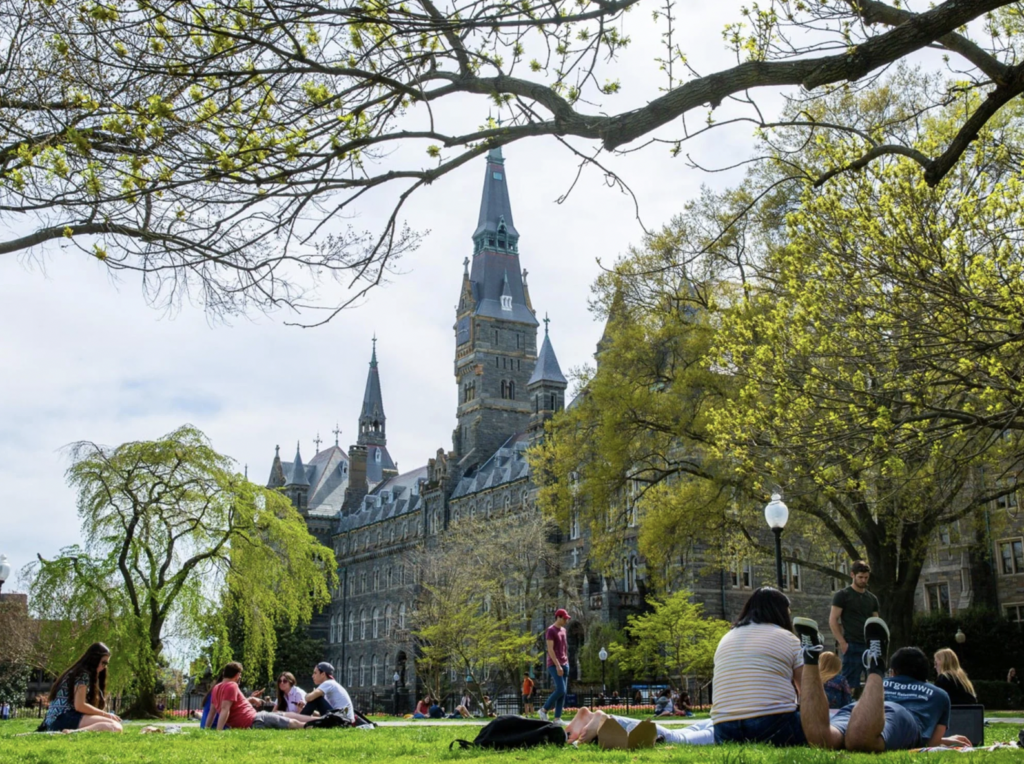The Georgetown Office of Sustainability, in collaboration with the Department of Planning and Facilities Management, launched a sustainable events pilot program that will provide composting and recycling services for large on-campus events during the Fall 2023 semester.
During this trial period, students can request that composting and recycling services be offered at their organization’s events by contacting the Office of Sustainability. The program organizers plan to roll out the full program in Spring 2024 after incorporating community feedback from pilot events this semester.
The sustainable events program, announced in Georgetown’s Green, Blue, and Gray environmental newsletter on Sept. 25, joins several ongoing university-wide initiatives to mitigate waste, such as new recycling signage in residence halls and recruitment for the Office of Sustainability’s EcoReps, a program for students who want to improve sustainability on campus.
Juan Hernandez, Georgetown’s Director of Custodial, Grounds, Recycling and Waste Management and a member of the planning team, shared how the development of the sustainable events pilot program began.
“The idea was born from seeing how much waste being generated at events on campus could be diverted, yet wasn’t,” Hernandez wrote to The Hoya. “The basic idea is to give event hosts the opportunity to ‘rent’ recycling bins and/or food waste (compost) bins as part of their equipment orders for their events.”
This semester, the sustainable event pilot has been part of several campus-wide events, such as the Welcome Back Jack BBQ and the New Student Orientation Goodbye Lunch. The pilot planning team is optimistic that student organizations will continue to use the new environmentally-friendly services.
The Georgetown Program Board (GPB), which regularly hosts large events for students, plans to use the sustainable events program to improve their environmental footprint, according to Will Hays (SFS ’25), the president of the GPB.
Hays said the program would allow the organization to streamline waste management, especially during events that provide food for students.
“I think this program would be very helpful for a lot of the catered events we do, like Sundae Sunday, where we give out free ice cream to students once a month,” Hays told The Hoya. “Having composting services can kind of help make the trash disposal process easier and help us remain eco-friendly. I see it as a win-win.”
Hernandez said the Department of Planning and Facilities Management designed the sustainable events pilot program offerings to produce as little nonessential waste as possible, maximizing waste reduction at large events.
“Currently, we (PFM Special Events) only offer cardboard boxes as trash bins for events. These boxes are not reusable and are usually discarded after each event. They are recycled, but they still represent unnecessary waste,” Hernandez wrote to The Hoya.

Once the program is fully launched, Hernandez hopes that students will be able to request sustainable event services through the Georgetown Event Management Services (GEMS) online website, where students typically reserve event spaces.
Hernandez said the program would ideally make it as easy to request composting services for students as it is to request tables and chairs.
“Our Events Setup Staff would deploy the bins with appropriate signage and set them in place at the event location. The food waste would be taken to a specific location on campus where it is properly stored and subsequently taken to a compost processing facility,” Hernandez said.
The composting process is more challenging than traditional recycling because it requires additional labor and diligence to ensure that non-compostable waste — metals and plastics — has not contaminated compostable foods, such as fruits and vegetables, according to Hernandez.
“There must be a person tending to the ‘compost station’ making sure only the right kinds of waste are being disposed of. This is not always feasible depending on the event,” Hernandez said.
To meet the program’s labor demands and spread information about sustainable living among students, the Georgetown Renewable Energy and Environmental Network (GREEN) has volunteered to run composting stations at on-campus events.
Emma Cheng (SFS ’25), a leader of GREEN’s Zero Waste Team, shared that the university’s pilot compost program supports GREEN’s goal of supporting environmental sustainability in the Georgetown community.
“Our role is generally to promote sustainable habits and raise awareness, voice our concerns to the university through, for example, the Office of Sustainability, and plan activities and presentations about zero waste,” Cheng told The Hoya.
Cheng emphasized the need for these programs to counter misguided narratives about university sustainability practices.
“There’s a conception on campus that the university doesn’t recycle or compost, which really damages the incentive for students to live sustainably,” Cheng wrote.
According to Cheng, initiatives like the sustainable events program have a lasting impact not only on the university’s environmental footprint but on the lifelong habits of students.
“Long-term sustainability projects are incredibly important in changing the campus environment and promoting sustainability as a norm for students not just during their time at Georgetown, but also as they move forward in their careers.”








